On the April 30, 1945 Adolf Hitler committed suicide in the ruins of Berlin. Six days later Germany surrendered, bringing about the final defeat of the Reich he had claimed would last for a thousand years.
The world had been changed forever. Germany had been utterly defeated; France had lost her great power status, and Britain, almost bankrupted by World War Two, barely clung to hers. The United States of America and the Soviet Union had emerged as the world’s dominant powers.
These two new superpowers were still nominally allies, having struggled together to overcome the terrible might of Nazi Germany. However, even as early as 1945, the seeds of future conflict had been sown.
In this list we’ll look at 10 reasons why the Cold War began in 1945.
10. The Death of Franklin Roosevelt
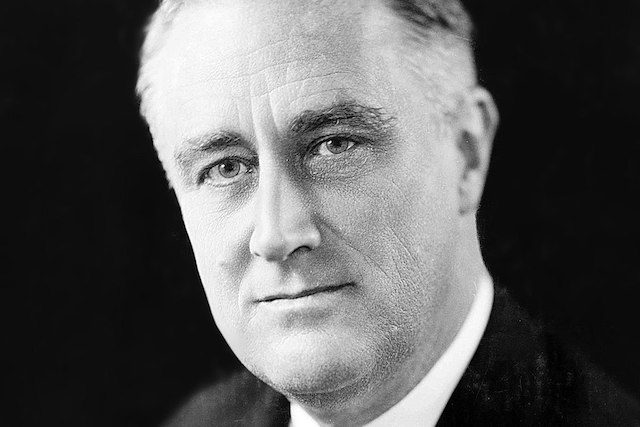
On April 12, 1945 President Franklin D. Roosevelt complained of a headache; just moments later he collapsed unconscious. He died later that same day.
When the news reached the heart of the imploding Third Reich, Hitler celebrated amidst the ruins of Berlin. The German dictator was desperate enough to clutch at any straws that presented themselves, and he convinced himself that the death of America’s president would mark a turning point in the war in Europe.
Despite Hitler’s initial optimism Roosevelt was replaced by Harry S. Truman, and World War Two continued its inevitable course towards Germany’s total defeat. However, Roosevelt’s death did significantly alter the dynamics of the post-war world.
Roosevelt is remembered as one of America’s great presidents, but he had something of a blind spot when it came to Joseph Stalin. He hadn’t recognized quite how wily and ruthless Stalin could be, and wrongly believed himself to be quite capable of charming the Soviet Union’s brutal dictator.
Harry Truman, Roosevelt’s successor, was altogether more suspicious of the Soviet Union in general and Stalin in particular. While Stalin initially believed Truman to be a nonentity who could be easily manipulated, this proved not to be the case.
9. Operation Unthinkable
Joseph Stalin spent much of World War Two haunted by the fear that Britain and America might betray him, make a separate peace with the Nazis, and leave the Soviet Union to fight on alone. In his worst nightmares his allies went even further and teamed up with Nazi Germany to destroy him.
While Stalin is remembered as one of history’s most murderously paranoid individuals, his concerns were not entirely without foundation. Winston Churchill in particular nursed a deep hatred of the Soviet Union that stretched right back to its creation.
In 1945, just days after the end of the war in Europe, Churchill asked his military planners to investigate the possibility of launching an almost immediate assault on Stalin’s Red Army. Churchill christened it Operation Unthinkable, for obvious reasons.
Quite how serious Churchill was about this extraordinary venture isn’t known for sure. In any event Operation Unthinkable was dead in the water with the report concluding there was no chance of success. The British couldn’t compete with the might of the Red Army. Even if the Americans could be persuaded to team up with the British, and they very much insisted they wouldn’t, the Soviets had more tanks and more men. The likely outcome was a long and bloody struggle.
Operation Unthinkable was shelved. However, Stalin soon learned all about it through his extensive network of spies. The news that at least one of his former allies was making plans to attack fueled his paranoia and contributed to the beginning of the Cold War.
8. Disagreements over the Fate of the Nazis
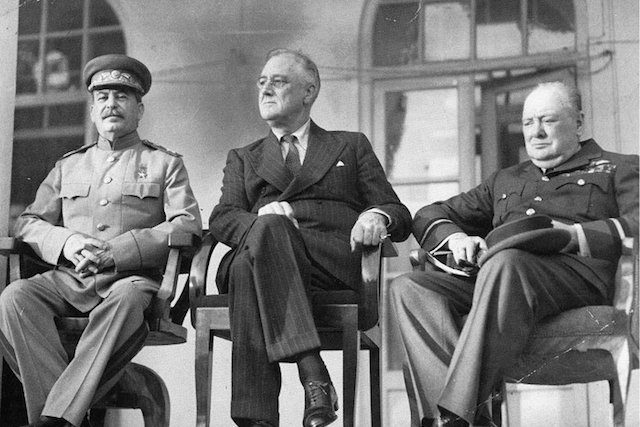
In November 1943 Winston Churchill, Franklin Roosevelt, and Joseph Stalin met face-to-face for the first time. There was still a huge amount of fighting and bloodshed to come; but the end of World War Two was finally in sight, and an Allied victory was all but inevitable.
The Tehran Conference was an opportunity for the “Big Three” leaders of the main Allied powers to discuss not just the war itself, but also how to handle the peace. One of the major questions to be addressed was what to do with any captured Nazis.
Stalin offered a solution that some 100,000 German Army officers should simply be shot.
While Roosevelt assumed Stalin was joking, Churchill took him more seriously and stormed out of the room in a fury. The British Prime Minister had himself suggested that senior Nazis should be hanged without recourse to legal aid, but as a former British Army officer he could not sanction the idea of slaughtering soldiers.
The three men eventually agreed that their enemies’ guilt should be established at trial, but they had very different ideas of what this should entail.
When Stalin held a trial he very much intended for the outcome, and even the script, to be determined well in advance. The British and Americans were determined that the trials be seen to be free and fair. As a result several Nazis walked free or escaped with their lives, including Albert Speer, who was Nazi Armament Minister and one of Hitler’s closest confidants. This was certainly not the outcome Stalin had been hoping for.
7. The Defeat of Japan
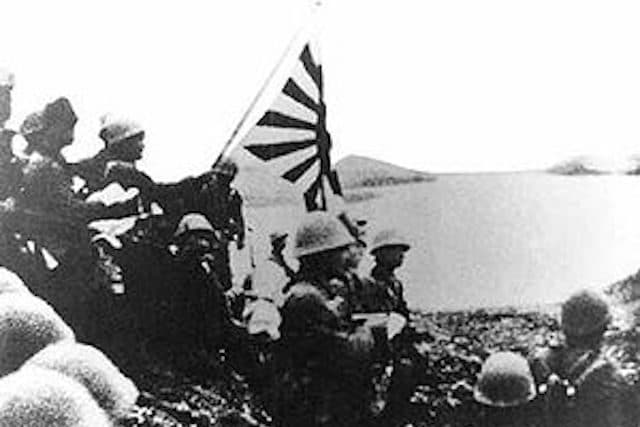
Japan had been at war with the United States of America and Great Britain since 1941, and with China since 1937. However, the Japanese Empire and the Soviet Union, despite sharing a land border, had not declared war on each other.
This had been a convenient arrangement for both powers. The Soviet Union had been locked in a life-or-death struggle with Nazi Germany in the west, and the Japanese more than had their hands full at land and sea in the east.
With the defeat of Nazi Germany Stalin turned his gaze east. Stalin had promised he would join the war against Japan once the war in Europe was over, and he was more than happy to grab some territory from the crumbling Japanese Empire.
On August 9, 1945 the Americans dropped a nuclear bomb on the city of Nagasaki. Earlier that day the Soviet Red Army had launched a huge surprise offensive against the Japanese in Manchuria. Some historians believe it was the Soviet assault, rather than the immense destructive power of America’s new atomic bombs, that persuaded the Japanese to announce their surrender just six days later.
While the Red Army’s war against the Japanese was brief, Stalin insisted that it warranted the Soviet Union a zone of occupation in the Japanese Home Islands. On August 16, 1945 Stalin wrote to Truman asking to be given part of the island of Hokkaido, adding that he hoped his modest wishes would not meet with any objection.
Roosevelt might, perhaps, have been amenable to the suggestion. Truman was far more suspicious of the Soviets and refused the request.
6. The Division of Korea

The Japanese announcement of their intention to surrender did not bring an immediate cease to hostilities. Stalin drove his armies on, determined to seize territory in the east while the going was good.
By August 1945 the Red Army was a devastatingly effective fighting machine, hardened by the titanic struggle against the forces of Nazi Germany. The forces of Imperial Japan, meanwhile, were much diminished. The best of the Japanese ground forces, and almost every serviceable aircraft, had been withdrawn from mainland Asia to the defense of the Japanese Home Islands.
The Red Army smashed aside the Japanese defenses making huge gains in Manchuria and pressing into Korea, which had been occupied by Japan since 1910.
There was no realistic possibility of the Americans mounting an invasion of Korea before the entire Korean Peninsula fell into Soviet hands. However, Stalin, prepared to trade influence in the Far East to strengthen his negotiating hand in Europe, agreed to divide Korea in two.
The Soviet Union would command the northern part of the country, which contained most of the heavy industry and mineral wealth, while the Americans took control of the largely agricultural south.
Both superpowers would install brutal puppet governments to serve their own interests. Korea was not split apart on any cultural, religious, ethnic, or historical basis, and the decision to divide the nation in two was destined to lead to future conflict. This came to pass when North Korea invaded South Korea in 1950, leading to the hottest conflict of the entire Cold War.
5. Clash of Ideologies
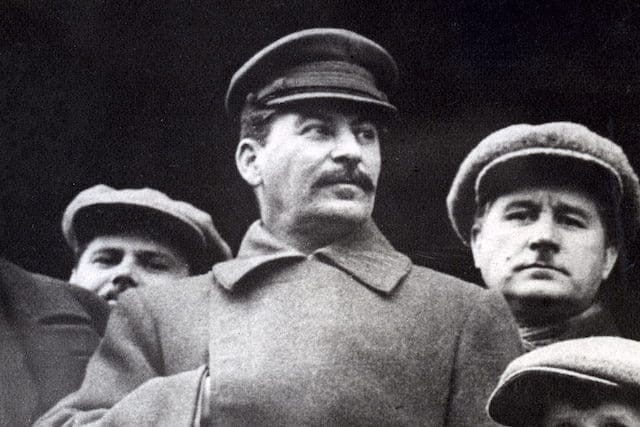
Adolf Hitler spent a good chunk of World War Two waiting for the alliance between the capitalist Western powers and the communist Soviet Union to fall apart. The long-awaited collapse in relations never materialized during his lifetime, but Hitler had not been entirely unreasonable in expecting it.
The alliance between the big three powers was one of the most unlikely in history. It was only made possible by the uniquely aggressive form of fascism that emerged in Germany, and it could not long survive the collapse of the Third Reich.
Communist ideology dictated that the collapse of capitalism was both desirable and inevitable. While communism is now a largely discredited theory, for much of the 20th century it posed a mortal threat to powerful individuals who reaped the main rewards of capitalism.
Stalin might have been paranoid, but it wasn’t without good reason. Shortly after the communist revolution Churchill had advocated “Strangling Bolshevism in its cradle.” The western powers had attempted to do just this, leading to a brutal civil war in Russia that lasted from 1917 to 1923.
Neither side can be absolved of blame for the Cold War. While it was perhaps not immediately apparent following the defeat of Germany in 1945, the incompatible nature of the two competing ideologies of communism and capitalism made future conflict inevitable.
4. Berlin Divided
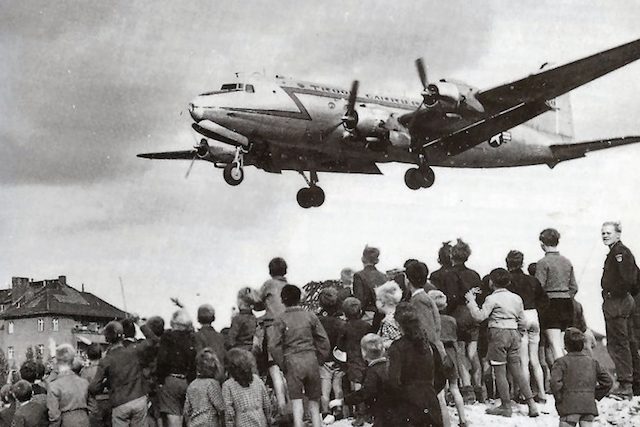
On May 2, 1945 the German defenders of Berlin surrendered to the Red Army. The battle had cost the lives of around 80,000 Soviet and 100,000 German soldiers.
Dwight Eisenhower, commander of the Allied forces in the west, is sometimes criticized for failing to drive his armies on and beat the Soviets to Germany’s capital city. It was a race that he might just have won, but it would have made no difference to the post-war map of Europe.
The division of Germany had already been decided through politics. Berlin itself lay well within what would be Soviet territory. However, the city would be divided up into four, with the Soviet Union, the United States of America, Great Britain, and France all given a zone of control.
This tiny enclave of Western democracy deep within Soviet controlled Eastern Germany soon came to infuriate Stalin. In 1948 he attempted to heal the open sore as he ordered the city to be blockaded, denying the Western Allies any links to the city by road, rail, or water. The Allies responded by flying in the supplies they needed. Stalin balked at giving the order to shoot down American aircraft, knowing that to do so would very likely result in war.
3. The End of American Isolationism
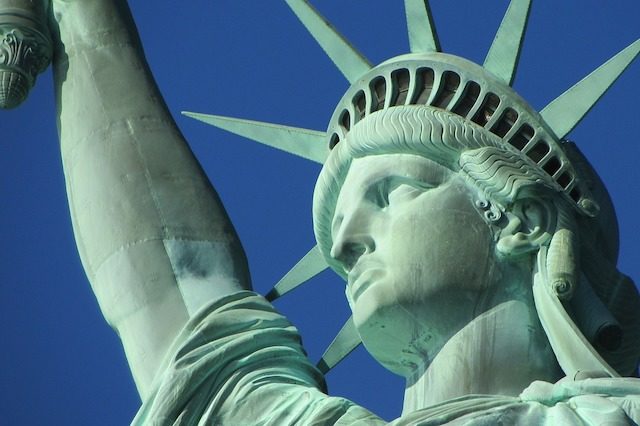
The United States of America had been traumatized by her involvement in World War One, where more than 100,000 Americans lost their lives. Determined to avoid being dragged into any more foreign wars America pursued a policy of isolationism. The nation maintained only a small army and avoided intervening in the affairs of other countries.
It didn’t work. America was dragged into another World War, this one even more terrible than the first. By 1945 isolationism was well and truly dead. The US had emerged as a global superpower with a vast military arsenal at its disposal.
Rather than retreating from the world, America would attempt to shape and control it. This was done even at the expense of democratic ideals, with the United States of America installing and supporting numerous dictatorships.
This more aggressive approach to international relations would inevitably lead to conflict with the Soviet Union, which was itself emboldened by its newfound superpower status and determined to export communism around the world.
2. The Fate of Eastern Europe
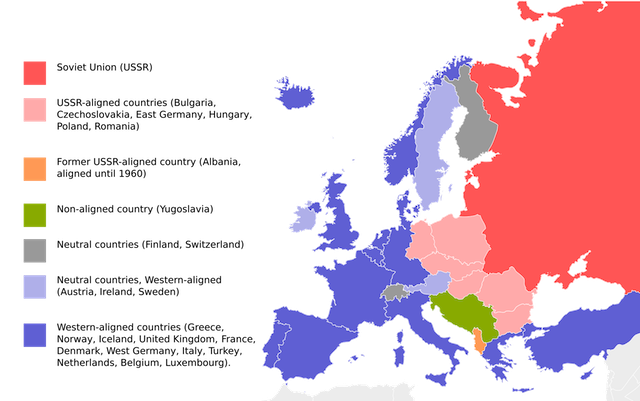
The British went to war with Nazi Germany in 1939 with the express goal of defending the right of Polish self-determination in the wake of Germany’s invasion. This was complicated by the failure of the British to declare war on the Soviet Union when the Red Army invaded eastern Poland having done a deal with Hitler.
The United States of America claimed to be fighting a war for freedom. This position too was complicated by the necessity of fighting alongside Stalin’s Soviet Union, a totalitarian dictatorship with few if any redeeming features.
When the war in the west drew to a close in May 1945, the Soviet Red Army had already occupied Poland and much of Eastern Europe. Short of attempting something quite as extraordinarily reckless as Operation Unthinkable, there was very little the Western Allies could do about this.
The British and Americans demanded that Stalin must hold free and fair elections in the territories he had occupied. Stalin readily agreed but went ahead and fixed the results of the elections regardless.
The Soviet domination of so much of Europe, a continent which had dominated world power far more than it does today, was a source of considerable discomfort and fear for America and the Western powers.
1. Nuclear Weapons
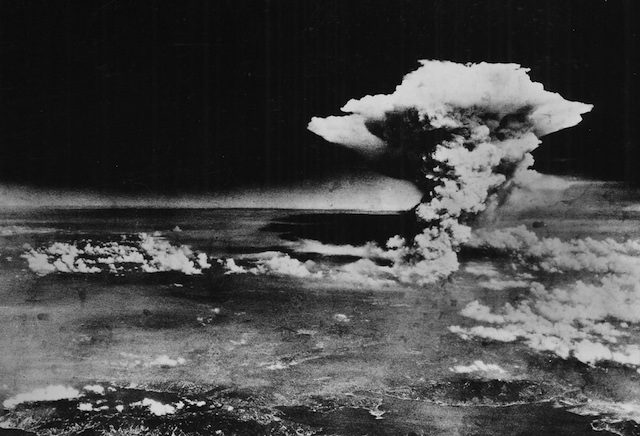
The atomic bomb that destroyed Hiroshima in 1945 exploded with as much force as 15,000 tons of TNT. As many as sixty thousand people were killed instantly, many of them simply vaporized, as temperatures briefly exceeded those on the surface of the sun.
Both Roosevelt and Churchill hoped that America’s new atomic capabilities would intimidate Stalin. However, when the Soviet dictator was informed of the weapon’s immense destructive power at the Yalta Conference in February 1945, he had shown barely any interest at all. It’s now known that the news had not come as a surprise. Stalin’s spies had kept him well informed of America’s top-secret new weapon, and his scientists were already racing to deliver Stalin a bomb of his own. This mission was accomplished by 1949, far sooner than the Americans believed possible.
The dawn of the atomic age in 1945 vastly raised the stakes for both the Soviet Union and the United States of America. It was now possible for a single bomber, carrying a single bomb, to incinerate an entire city. The two superpowers would later develop intercontinental ballistic missiles and a stockpile of nuclear warheads capable of wiping out most life on the planet. Both sides were aware that if the Cold War turned hot, it might mean the end of civilization. This went a long way towards focusing minds on finding diplomatic solutions to disagreements that might otherwise have led to war.
As terrible as nuclear weapons are, and despite the threat they continue to pose to the future of humanity, they probably prevented all-out war between the United States of America and the Soviet Union.